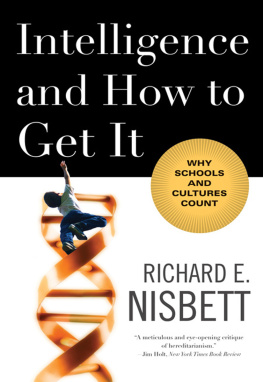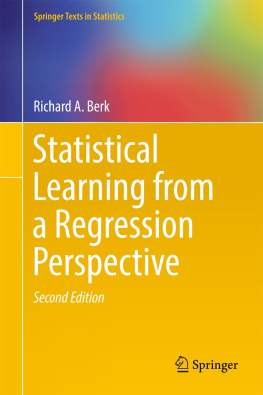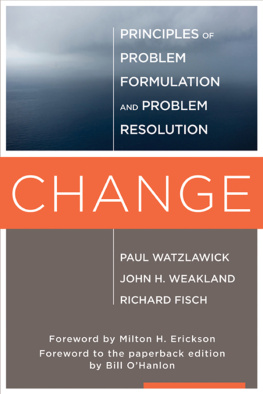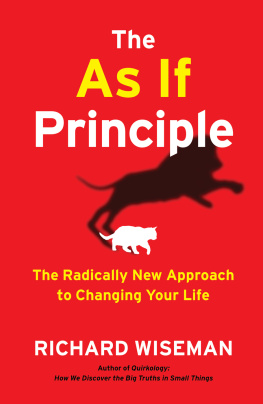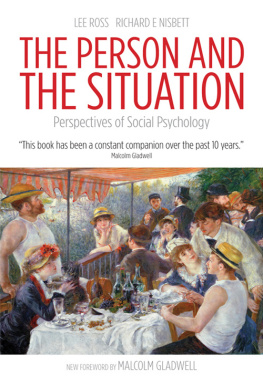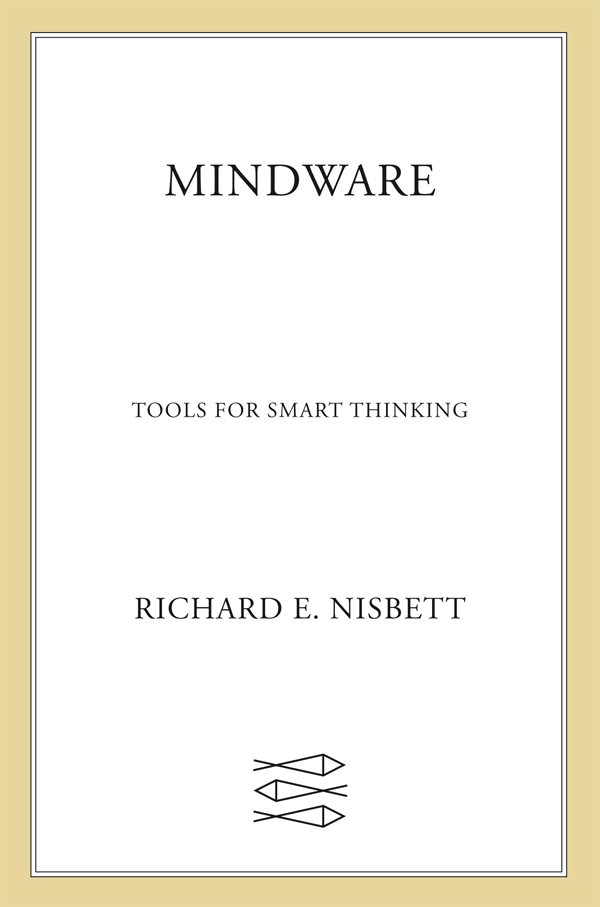Contents
Guide

The author and publisher have provided this e-book to you for your personal use only. You may not make this e-book publicly available in any way. Copyright infringement is against the law. If you believe the copy of this e-book you are reading infringes on the authors copyright, please notify the publisher at: us.macmillanusa.com/piracy.
For Sarah Nisbett
The logic of science is the logic of business and of life.
John Stuart Mill
In an earlier era, when many people were involved in surveying land, it made sense to require that almost every student entering a top college know something of trigonometry. Today, a basic grounding in probability, statistics and decision analysis makes far more sense.
Lawrence Summers, former president of Harvard University
The word cosine never ever comes up.
Roz Chast, Secrets of Adulthood
You paid twelve dollars for a ticket to a movie that, you realize after a half an hour of watching it, is quite uninteresting and tedious. Should you stay at the theater or leave?
You own two stocks, one of which has done quite well over the past few years and the other of which has actually lost a little since you bought it. You need some money and have to sell one of the stocks. Do you sell the successful stock in order to avoid locking in your losses on the unsuccessful stock, or do you sell the unsuccessful stock in hopes that the successful one will continue to make more money?
You must choose between two candidates for a job. Candidate A has more experience and stronger recommendations than candidate B, but in the interview candidate B seems brighter and more energetic than candidate A. Which do you hire?
You are a human relations officer for a company. Several women have written you to complain that their job applications were turned down in favor of men with poorer job qualifications. How could you go about finding whether there is really discrimination on the basis of gender?
Time magazine recently reported that parents should not try to control their childrens food intake because parents who do that have children who are likely to be overweight. Do you see anything dubious about that claim?
People who have a drink or two of alcohol once a day have fewer cardiovascular problems than people who dont. Assuming you drink less than that, should you increase your alcohol intake? Should you decrease it if you drink more than that?
Problems like those above dont appear on IQ tests, but there are smarter and less smart ways of solving them. By the time youve finished this book, youll have a cognitive tool kit that will allow you to think about such problemsand infinitely more besidesmuch differently than you would now. The tools are one hundred or so concepts, principles, and rules of inference developed by scientists in many fieldsespecially psychology and economicsand by statisticians, logicians, and philosophers. Sometimes commonsense approaches to problems produce errors in judgment and unfortunate actions. The concepts in this book will show you how to think and act more effectively. The ideas provide a supplement to common senserules and principles you can learn to apply automatically and effortlessly to countless problems that crop up in everyday life.
This book addresses some of the most fundamental questions about how to reason and make valid inferences. What counts as an explanation (for everything from why our friend acts in such an annoying way to why a product launch failed)? How can we tell the difference between events that are causally related and events that are merely associated with each other in time or place? What kinds of knowledge can be considered certain and what kinds only conjectural? What are the characteristics of a good theoryin science and in everyday life? How can we tell the difference between theories that can be falsified and those that cant? If we have a theory about what kinds of business or professional practices are effective, how can we test that theory in a convincing way?
The media bombard us with alleged scientific findings, many of which are simply wrong. How can we evaluate conflicting scientific claims we encounter in the media? When should we trust the expertsassuming we can find themand when should we be dubious?
And most important, how can we increase the likelihood that the choices we make will best serve our purposes and improve the lives of ourselves and others?
Can Reasoning Really Be Taught?
But can people actually be taught to think more effectively? Not just to know more things, such as the capital of Uzbekistan or the procedure for extracting square roots, but actually to reason more correctly and solve personal and professional problems more satisfactorily.
The answer to this question is far from obvious, though for twenty-six hundred years many philosophers and educators were confident that reasoning could be taught. Plato said, Even the dull, if they have had arithmetical training, always become much quicker than they would otherwise have been We must endeavor to persuade those who are to be the principal men of our state to go and learn arithmetic. Later, Roman philosophers added studying grammar and exercising the memory to the practices that would improve reasoning. The medieval scholastics emphasized logic, particularly syllogisms (e.g., All men are mortal. Socrates is a man, therefore Socrates is mortal). The humanists of the Renaissance added Latin and Greek, possibly because they thought that using those languages contributed to the success of these ancient civilizations.
The faith in drilling mathematical, logical, and linguistic rules was strong enough that by the nineteenth century some people believed that pure exercise of the brain on difficult rule systems any difficult rule systemwas enough to make people smarter. A nineteenth-century educator was able to maintain, My claim for Latin, as an Englishman and a teacher, is simply that it would be impossible to devise for English boys a better teaching instrument. The acquisition of a language is educationally of no importance; what is important is the process of acquiring it. The one great merit of Latin as a teaching instrument is its tremendous difficulty.
There never was a shred of evidence for any of these educational viewsfrom those of Plato to those of the fusty old Latin teacher. So psychologists in the early twentieth century set out to produce some scientific evidence about reasoning and how to improve it.
The early returns were not good for what had come to be called formal disciplinetraining in how to think as opposed to what to know. At the turn of the century, Edward Thorndike maintained that no amount of brain exercise or drilling in abstract rules of thought would serve to make people smarter and pronounced the learning Latin theory of education to be defunct. He claimed that his experiments showed that transfer of training from one cognitive task to another occurred only if the problems were extremely similar in their concrete features. But the tasks that Thorndike studied didnt really qualify as ones involving reasoning: for example, he found that practicing cancellation of letters in a sentence produced no increase in speed of canceling parts of speech in a paragraph. This is scarcely what you would think of as reasoning.
Herbert Simon and Allen Newell, the great midcentury computer scientists, also claimed that people couldnt learn abstract rules for reasoning and provided somewhat better evidence. But their argument was based on very limited observations. Learning how to solve the Towers of Hanoi problem (transferring a stack of disks from one pole to another without ever placing a bigger disk on a smaller one, a game you may have played as a child) didnt produce improvement on the Missionaries and Cannibals problem, which requires a plan for getting missionaries across a river without ever allowing the missionaries on the boat to be outnumbered by the cannibals. The two problems have the same formal structure, but there was no transfer of training on how to solve one problem to ability to solve the other. This result was interesting, but scarcely enough to convince us that training on a given problem could never generalize to solving a problem with a similar structure.


